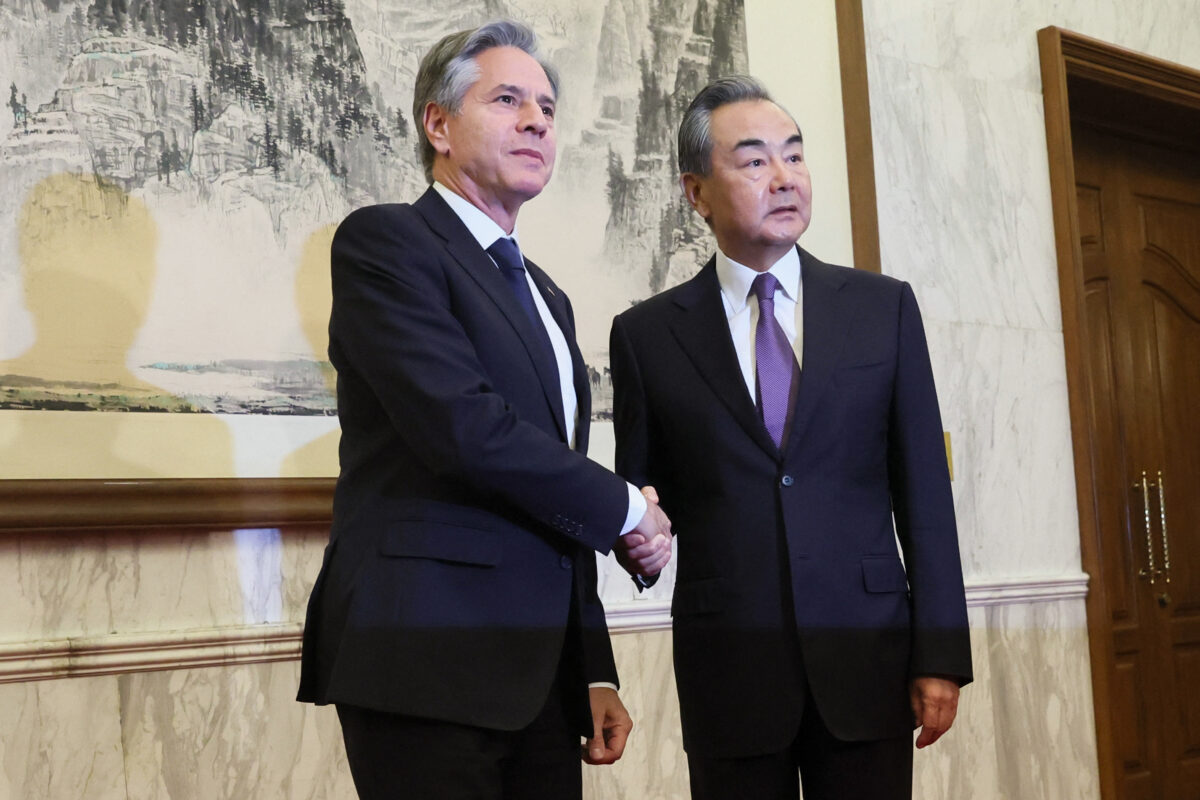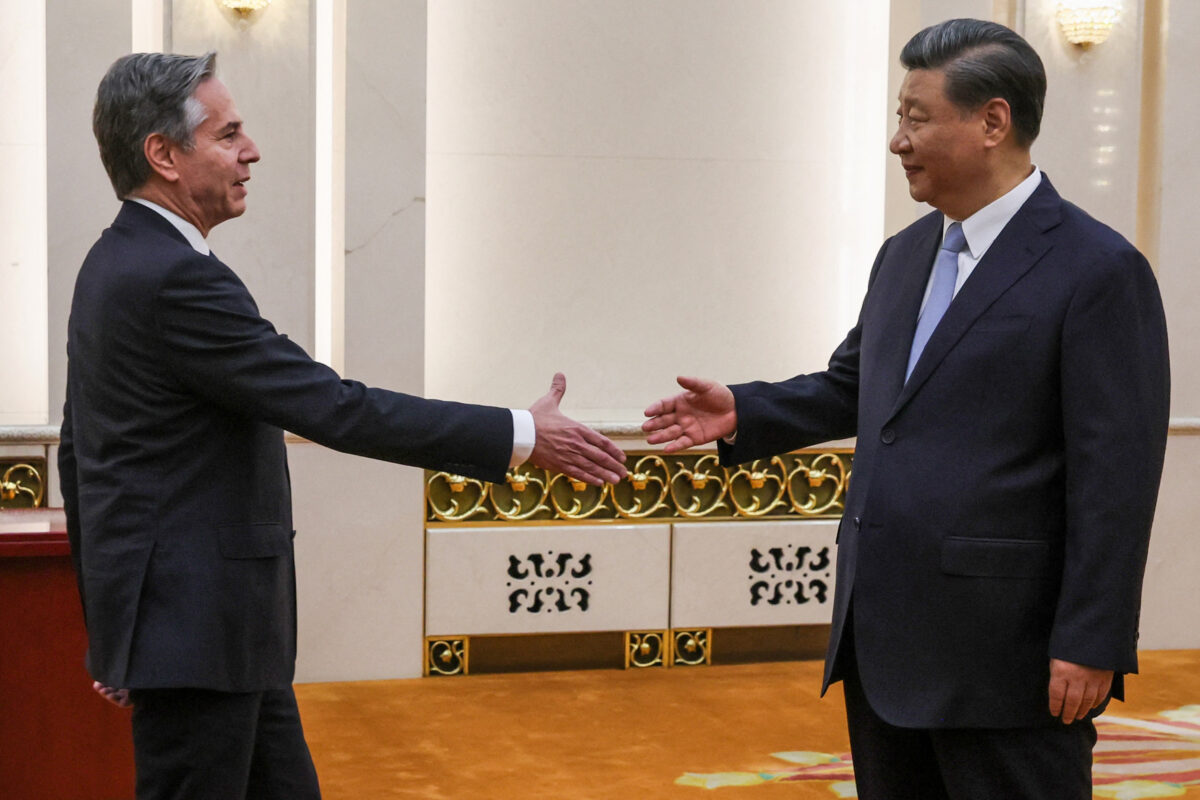U.S. Secretary of State Antony Blinken is meeting Chinese leader Xi Jinping on Monday, hours after concluding his talks with China’s top diplomat Wang Yi.
Blinken arrived in China on June 17 for the start of a two-day visit, a trip that the Biden administration seeks to maintain open lines of communication with the Chinese Communist Party (CCP).
On Sunday, Blinken met with Chinese Foreign Minister Qin Gang, and their talks have been characterized as “candid” and “constructive” by officials from both sides.
According to China’s state-run media, the Xi and Blinken meeting will take place soon.
Hours earlier, Blinken and Wang shook hands and posed for photos, before the start of their closed-door meeting.
In a statement following talks with Wang, the State Department said Blinken “underscored the importance of responsibly managing the competition between the United States and the PRC [People’s Republic of China] through open channels of communication to ensure competition does not veer into conflict.”
During their talks, Wang accused the United States of having a “flawed perception” of China, resulting in the current strained bilateral relationship, according to a statement from China’s foreign ministry. Wang asked the U.S. side to “reflect deeply” and work with Beijing.
According to the Chinese statement, Wang also demanded that the United States lift its sanctions against China and support its territorial claim over Taiwan.
The U.S. government has imposed trade restrictions against Chinese companies and entities in recent years. Recent examples include adding 28 Chinese entities to a U.S. blacklist in March, for their alleged ties to the Iranian military.

Prior to Blinken’s trip, a group of GOP lawmakers wrote to the secretary of state asking him to add a stopover in Taiwan to his itinerary. The communist regime has repeatedly threatened to use military force to annex the self-ruled island.
Blinken’s trip, which marks the highest-ranking U.S. official since President Joe Biden took office to visit China, has been drawing criticism from some Republicans and experts as a mistake, with some pointing to China’s recent aggressive tactics against the United States.
Earlier this year, the U.S. military had to shoot down a Chinese surveillance balloon, after it flew over the continental United States for about a week. Recently, the Biden administration revealed that China has been operating a base with intelligence-collecting capabilities in Cuba.
Blinken was originally going to visit China in February, but his trip was postponed after the Chinese spy balloon made headlines in the United States.
Concerns
On Sunday, former National Security Adviser H.R. McMaster suggested that Blinken may have put the United States in a position of weakness by visiting China.
“With Secretary Blinken’s visit there, it may portray a bit of weakness,” McMaster told CBS’ “Face the Nation.”
“I think we’ve been so anxious to have this discussion with the Chinese and the Chinese have been really playing hard-to-get in terms of the discussion,” McMaster added. “I think what they hope with the optics of this meeting, and I’m sure Secretary Blinken is quite aware of this is, to create a perception that we’re going there to pay homage to the Chinese Communist Party.”
“I think China’s sending a message: ‘Hey, we’re in charge now. You’re finished’ to the West and to the United States,” McMaster continued. “And I think it’s indicative of what they hope to achieve … which is to create kind of an exclusionary area of primacy across the Indo-Pacific region. They’ve laid claim to the ocean in the South China Sea, for example.”
Gordon Chang, a senior fellow at the Gatestone Institute, questioned why the United States would want to maintain dialogue with China.
“Why should we try to ‘maintain communication’? #China talks when it wants to and won’t talk when it doesn’t. We should not be begging for communication,” Chang wrote on Twitter on June 18. “Begging is unnecessary and gives #Beijing leverage when it otherwise has none.”
For some, the key issue is whether Blinken has used his face-to-face meetings with CCP officials to raise concerns about China’s record of human rights violations.
“I hope in these ‘candid’ talks, Secretary Blinken brought up the genocide against Uyghurs, oppression of Hong Kong and the crushing of religious freedom and human rights by the Chinese government!” wrote Rev. Patrick Mahoney of the Christian Defense Coalition on Twitter on June 18.
In China, the communist regime has systematically persecuted Christians, Falun Gong practitioners, Tibetans, and Uyghurs. In China’s far-western region of Xinjiang, over a million Uyghurs and other Muslim minorities are currently being held in Chinese internment camps, where they face forced labor, torture, sexual abuse, political indoctrination, forced abortion, and forced sterilization.
Kenneth Roth, former executive director of Human Rights Watch, said Blinken should bring up China’s persecution of Uyghurs, which the U.S. government has designated as genocide.
“It would be a complete abdication of Blinken’s responsibilities if his only public human rights points in China were to press for the release of American citizens without mentioning the one million Uyghur/Turkic Muslims detained for forced indoctrination,” Roth wrote on Twitter on June 18.
The Associated Press contributed to this report.

















































